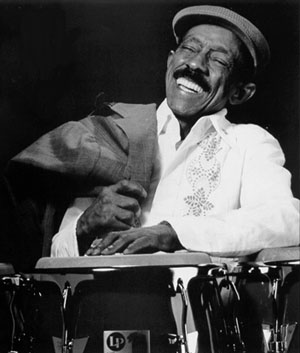
Born to a musical family in Havana in 1926, Patato grew up playing the Cuban guitar known as tres, as well as the African thumb piano and numerous other instruments. By the time he was a teenager, he was already considered one of the hottest conga players in Cuba, and at a time when American high society regularly vacationed in Havana, Patato became one of the featured players in the country’s famed Conjunto Casino. He also played with Chano Pozo, who helped create the Latin jazz movement with Dizzy Gillespie, and with Mongo Santamaría.
He emigrated to the United States to take advantage of the burgeoning jazz scene, and lived in New York since 1954. There, he immediately found himself in demand. First hired by Tito Puente, Patato went on to play with the great Machito and Kenny Dorham. Then he hooked up with Herbie Mann, in a musical partnership that would last nearly a decade.
"A wild personality and a funny cat. He’s exciting and pixie-ish at the same time," Mann was quoted as saying on the 1965 Atlantic release Standing Ovation At Newport. And indeed Patato made a name for himself as a character as well as a musician. Whether jumping on top of his congas barefoot or appearing on television (including "The Bill Cosby Show"), Patato’s image was that of a man who knew how to have a good time – and didn’t mind sharing that knowledge.
After leaving Herbie Mann in the mid 1960s, Patato teamed up with the singer Totico, a boyhood friend from Havana, on the 1967 Verve album Patato y Totico. This record documented the vitality of an increasingly important rumba scene that was emerging in New York City and included such giants as Israel "Cachao" López on bass and Arsenio Rodríguez on tres.
In the following years, Patato recorded and toured with virtually the entire world’s leading Latin Jazz artists, including Cachao and Machito. In 1995 he recorded the first of two albums in the series Ritmo y Candela with the second volume coming a year later. Both albums received Grammy nominations in the newly appointed Latin Jazz category. Patato: The Legend of Cuban Percussion is compiled from those two recordings, and even on a record with several world-class drummers, there’s no mistaking Patato’s playing.
Patato invented a more easily tuned conga that became the standard for Latin Percussion, the most famous conga manufacturer. His melodic approach to the conga makes the drum sing, and his fingers seem as nimble today as they were in the days when he was playing with Arsenio Rodríguez in New York, helping to blaze the trail that led to the musical style known as salsa. Virtually any percussionist who’s played salsa, or Cuban son, or Latin jazz in the past thirty years owes a debt to Patato.
He is survived by his wife, Julia; his two daughters, Yvonne and Regla; and his two grandchildren, José Valdés and Mayra García.
Author: World Music Central News Room
World music news from the editors at World Music Central


